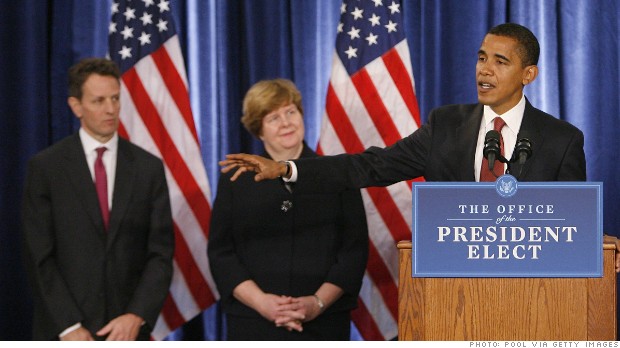
President-elect Obama announced Tim Geithner as his nominee for treasury secretary shortly after the 2008 election.
NEW YORK (CNNMoney)
He was one of the least wealthy Treasury chiefs in recent history -- and he suffered at least a 50% pay cut when taking that job.
But with a new appointment at the private equity firm Warburg Pincus, plus income from a book deal and paid speeches, Geithner is poised to make many times his salary in the public sector, where he worked for 25 years.
Geithner was a pauper next to his predecessor Hank Paulson, the former Goldman Sachs Goldman CEO who was possibly worth upwards of $500 million. Although Paulson was one of the richest Treasury secretaries, many who take the job do so after a lucrative career on Wall Street.
Not Geithner. He started at the Treasury Department in 1988 after a short time at the consulting firm Kissinger Associates. Geithner specialized in international economics and rose through the Treasury ranks, then took a leadership role at the International Monetary Fund. In 2003, he was picked to head the Federal Reserve Bank of New York.
Geithner earned $411,200, plus benefits and an even larger severance payout, in his final year at the Fed, according to financial disclosures.
As Treasury secretary, he earned a salary of $199,700. His net worth has been estimated at between $239,000 and $6 million.
Related: How much is a Treasury Secretary worth?
Neither the private equity firm, book publisher nor speaking agency disclosed details of Geithner's pay.
But his fee per speech is estimated to reach six figures, in line with speaking fees paid to other former top government officials. In the first half of this year, he brought in $400,000 for three speeches, according to the Financial Times, which cited unnamed people familiar with the speeches. One was at the annual meeting of Warburg Pincus, the Financial Times reported.
Random House announced last spring Geithner was working on a book about the financial crisis.
His will follow the 2010 publication of Paulson's "On the Brink." Paulson made the first TARP payments before handing the baton to Geithner, and now leads a think tank at the University of Chicago.
Related: Where are the key players of the fiscal crisis now?
But several secretaries before Paulson returned to the private sector, including Robert Rubin, who served under President Clinton, then took a key post at Citigroup -- one of the banks which needed billions in federal bailout money to stay afloat.
The so-called revolving door between the public and private sectors gives government officials a route to cash in, said Chris Edwards, director of tax policy studies at the Cato Institute.
"The federal government pay scale tends to compress earnings into a narrower range than private markets," he said. Lower-ranked officials make more than their private sector peers, but "at the top end, there's absolutely no doubt ... that they can do better in the private sector."
Edwards said financial firms value former federal workers for two reasons: their connections and their understanding of the byzantine rules, regulations and processes inside Washington. They're also willing to pay someone of Geithner's experience many, many times his federal salary, he said.
Related: What Jack Lew is worth
And then there's the prestige of bringing Tim Geithner on board.
"Any financial firm would be thrilled to have a Treasury secretary who understands everything about [the way] Washington speaks," said Melanie Sloan, executive director of Citizens for Responsibility and Ethics in Washington. "Any cabinet secretary can expect to go out and make a lot of money, but particularly in Treasury."
Geithner left office in January and begins at Warburg Pincus in March 2014. He is barred for one year from lobbying the government on issues he previously worked on, Sloan said, although the firm did not say Geithner's role includes lobbying.
Warburg Pincus said Geithner will have a significant strategic and managerial role as president and managing director. The firm holds $35 billion in assets -- though in some ways, that's small change compared to Geithner's experience overseeing the $17 trillion U.S. economy. ![]()
First Published: November 18, 2013: 4:10 AM ET
Anda sedang membaca artikel tentang
For Geithner, a lucrative life in the private sector
Dengan url
http://ngopingeteh.blogspot.com/2013/11/for-geithner-lucrative-life-in-private.html
Anda boleh menyebar luaskannya atau mengcopy paste-nya
For Geithner, a lucrative life in the private sector
namun jangan lupa untuk meletakkan link
For Geithner, a lucrative life in the private sector
sebagai sumbernya
0 komentar:
Posting Komentar